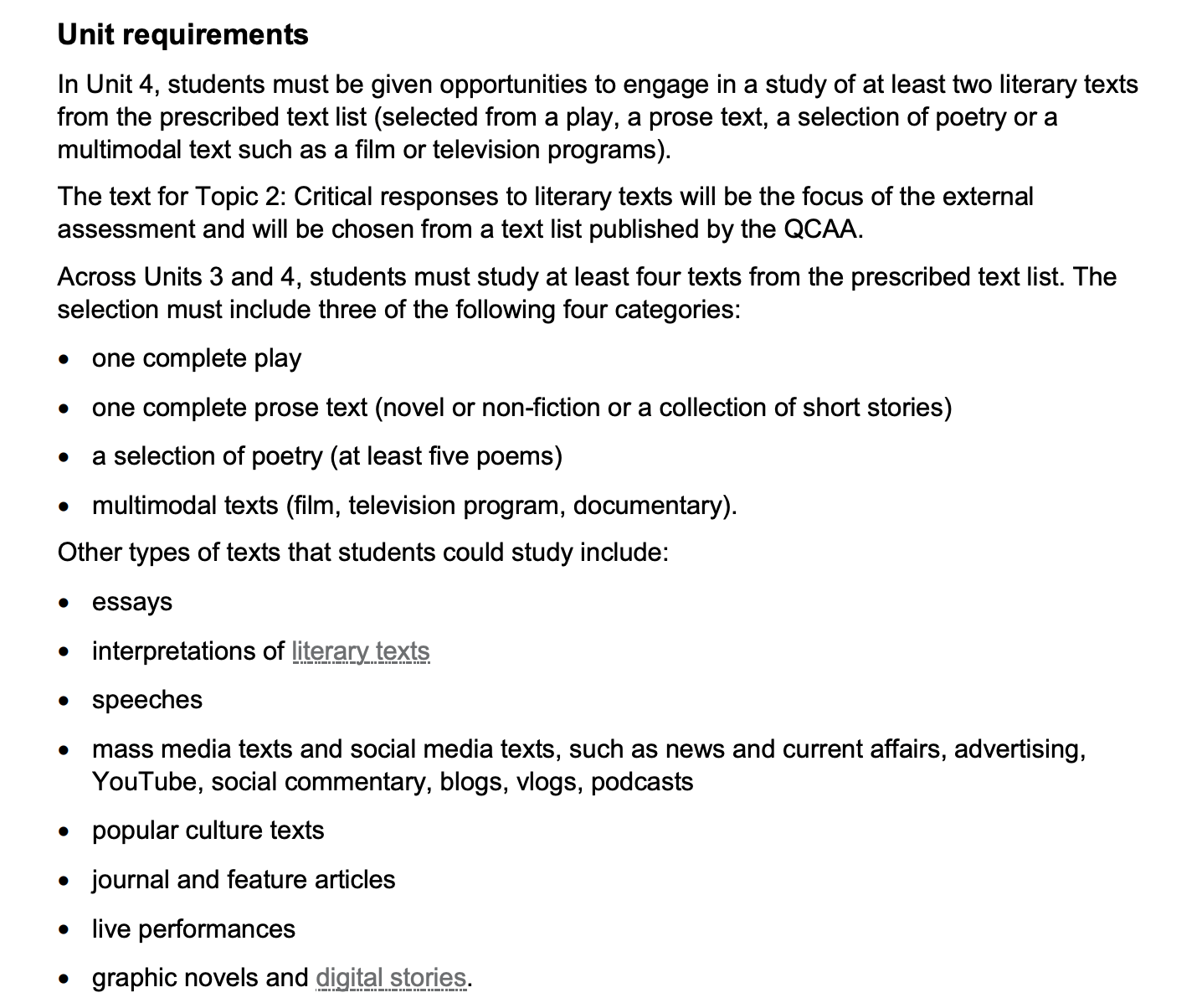Zoomed through Unit 3 of QCAA English and are about to start working on Unit 4?
We want to make studying for this final unit of English a little simpler, so we’ll take you through a summary of each of the topics you’ll be learning and tips on acing your assessments.
Ready to get started? Let’s go!
What is Unit 4 in QCAA English all about?
What will you be tested on?
Topic 1 and IA3: Creative Responses to Literary Texts
Topic 2 and EA: Critical Responses to Literary Texts
Skills You Should Keep in Mind for Your EA
What is Unit 4 in QCAA English all about?
This unit is all about crafting creative pieces, as well as analysing creative texts.
In IA3 and your EA, you will be asked to analyse various texts from different cultural perspectives, as well as times. Your teacher will pick the novels and texts you will study from the selected QCAA list.
Essentially, Unit 4 shapes up to be completely different in terms of assessment requirement than the previous two units, as you are no longer required to write persuasively, but analytically and creatively. The weighting of your assessments, however, remains the same.
Here below is the breakdown of approximate assessment weighting:
- IA3 = 25%
- EA = 25%
What will you be tested on?
As with Unit 3, there is no telling for certain which texts you will have to study. They are most likely going to be picked by your teacher, from a QCAA advised list.
Although there is a much higher chance that the texts you will get to study are going to be related to classical forms (novels and short stories), it is still possible you will be asked to analyse other forms of texts, including plays (that have become somewhat common) or live performances, as well as graphic novels, as talked about in our Guide for Unit 3.
In QCAA’s own words:
Topic 1 and IA3: Creative Responses to Literary Texts
For IA3, you will be asked to write a short creative response (2000 words approximately) taking inspiration from some of the texts you will have studied in class. By taking inspiration, you will have to come up with your original creative piece, that will have to produce intended effects on readers.
Although there is a lot of freedom with this assessment, a lot of people will find it difficult to complete. This is due to the fact that thinking creatively in a developed way is difficult if you read little fiction, or English isn’t your strong suit.
How can you do well?
- Have an original plot. Although this may sound basic, many students trip up on basic story writing conventions, like character arcs and resolution.
- Make sure your story has a moral message. In the end, you will be marked on how effectively you convey that message to audiences.
- Take advantage of your draft feedback, giving your draft the best shot you can.
Here are some other important things to include in your IA3 according to QCAA:
- Explore how personal responses to texts are shaped by elements of an individual’s contexts, e.g. locality, family background, beliefs, experiences, gender, age, psychology, culture
- Experiment with form, content, perspective, grammar and language features to develop personal style in imaginative texts
- Experiment with aesthetic features and stylistic devices in different mediums to examine the various critical and emotional responses they may prompt in audiences of imaginative texts
- Examine various examples of the imaginative text type to be produced for the internal assessment
- Participate in teacher-modelled, guided, shared and independent construction of texts in a variety of modes and classroom contexts
For more advice on working through this IA, check out our guide here! You can also see how your marks are tracking for the entire year in English with our nifty QCE Cohort Comparison Tool!
Topic 2 and EA: Critical Responses to Literary Texts
This section, and your last assessment for English, is all about your EA. You will most likely be asked to analyse a play, Shakespearean by all accounts.
Although, don’t exclude the possibility to be asked to analyse something in a format much different from a play, as this is specified by QCAA. The format will be of a literary essay, somewhat like the literary article you’ll have written in IA1. Nevertheless, its tone and structure will differ slightly.
This assessment will be marked externally, and you will most likely be somewhat stressed when you write it. Thus, it begs the question…
How can you do well?
- Follow the structure. You can check out our essay writing guide for an in-depth look at how to structure your essay.
- Make sure you have all the quotes you need. Look for the most impactful and versatile you can find.
- Make sure your essay focuses on multiple literary techniques, having variety.
Keep in mind these other points straight from QCAA:
- Explore how personal responses to texts are shaped by elements of an individual’s contexts, e.g. locality, family background, beliefs, experiences, gender, age, psychology, culture
- Explore and discuss a range of contemporaneous, historical and contemporary interpretations and perspectives of literary texts
- Test, develop and deepen own interpretations of literary texts through discussion, debate and examination of others’ interpretations
- Develop cogent, insightful analysis and argument, through synthesis of subject matter and integration of
textual evidence - Use cohesive devices to develop and emphasise ideas and connect parts of texts in the development of
a reasoned and logical argument - Use text structures, grammar, language features and written features related to literary analysis to
express and sustain a point of view - Participate in teacher-modelled, guided, shared and independent construction of analytical texts in a
variety of modes and classroom contexts - Develop editorial independence by using strategies for planning, drafting, editing and proofreading to
produce appropriately sequenced and coherent texts - Reflect on and respond to feedback
Head here for our tips on preparing for your QCAA English EA here!
Skills You Should Keep in Mind for Your EA
Organise ideas cohesively, persuasively and in a succinct but structured manner still remains the main transferable skill with this set of assessments to bring to your EA.
As in Unit 3, these writing skills will be useful when writing resumes, cover letters, reports, and even creative writing for some that you will undoubtedly have to deal with in your working and academic life.
Something you should keep in mind for your EA that you can take straight from IA3 is of course the creative aspect of the writing. You will be required to think on your feet in terms of the question you are posed to analyse, making creativity a major contributing factor.
The last set of skills, and perhaps the most important one, is your analytical approach. This is completely transferable to your EA, which will focus specifically on it. In a certain sense, the depth at which you analyse should remain the same, if not increase when faced with the EA!
Not sure which school is best for ATAR? We’ve done the hard work for you! Check out the results here for the top public and private schools in Brisbane!
On the hunt for other QCAA English resources?
Check out our other guides and articles for QCAA English below:
- QCAA English: The Ultimate Guide to Achieving an A
- QCAA Practice Questions for Unit 3 & 4 English External Assessment
- How to Write Notes Using the QCAA Syllabus for English
- How to Write an Analytical Written Response for Your QCAA English Exam
- Practice Questions to help you prepare for the English External Exam
Looking for help with other Unit 4 content in various QCE Subjects? Check out our Unit 4 guide to Physics or our Unit 4 Guide to Maths Methods
Are you looking for some extra support with QCAA English Unit 4?
We have an incredible team of QLD English tutors and mentors!
We can help you master the QCAA English syllabus and ace your upcoming English assessments with personalised lessons conducted one-on-one in your home or online!
Looking for an English tutor in Brisbane? Check out more info on our holistic English tutoring here!
We’ve supported over 8,000 students over the last 11 years, and on average our students score mark improvements of over 20%!
To find out more and get started with an inspirational QLD tutor and mentor, get in touch today or give us a ring on 1300 267 888!
Vittorio Manessi is an Art of Smart tutor based in Queensland studying environmental science. He was one of the first Year 12 students to study under the new ATAR system in Queensland. He enjoys Maths, Science, English and Ancient History and is keen to share his knowledge of the QCE by making awesome resources.





